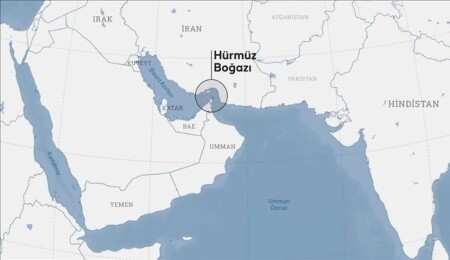Iranian Closure of Hormuz Strait Could Rattle Global Energy Markets

Apotential closure of Strait of Hormuz, a vital trade route that lies between Iran and Oman and accounts for roughly a fifth of global oil supply could rattle global energy markets, sending the price of commodity likely much higher than current level of around $77.

The latest attacks by the U.S. on the nuclear sites in Iran sparked fears of Iran closing the strait, where around 30% of the global crude oil and 20% of the liquefied natural gas (LNG) are transported.
In response, oil prices jumped on Monday, reaching their highest since January as the United States' weekend move to join Israel in attacking Iran stoked supply concerns.
Brent crude futures were up 72 cents or 0.93% to $77.73 a barrel as of 8:06 a.m. GMT. U.S. West Texas Intermediate (WTI) crude advanced 71 cents or 0.96% to $74.55.
Iran is the world's ninth-biggest oil-producing country, with an output of about 3.3 million barrels per day (bpd). It exports just under half of that amount and consumes the rest. It is also one of the five founding members of the Organization of the Petroleum Exporting Countries (OPEC).
'Not good for anybody'
An Iranian closure of the Strait of Hormuz would be dangerous and "not good for anybody," the European Union's top diplomat, Kaja Kallas, said on Monday.
"The concerns of retaliation and this war escalating are huge, especially the closing of the Strait of Hormuz by Iran is something that would be extremely dangerous and not good for anybody," Kallas told reporters ahead of a meeting with EU foreign ministers.
Iran's Press TV reported on Sunday that Iran's Supreme National Security Council needed to make a final decision on whether to close the strait, after parliament was reported to back the measure.
Although Iran vowed to defend itself, many analysts find it unlikely that Iran would retaliate by closing the narrow Hormuz Strait.
The strait is situated between Oman and Iran and links the Gulf of Oman to the north, the Gulf of Oman to the south, and the Arabian Sea beyond.
"So far, satellite images reportedly suggest that oil continues to flow through the Strait, which may explain the muted market reaction to the news," said Ipek Ozkardeskaya, senior analyst at Swissquote Bank.
"Many remain optimistic that Iran will avoid a full-blown retaliation and regional chaos, to prevent its own oil facilities from becoming targets and to avoid a widening conflict that could hurt China, its biggest oil customer."
But "if things get uglier," the price of U.S. crude could even spike beyond $100 per barrel, she said. WTI was trading around $75 per barrel on Monday.
Closing off the waterway would be technically difficult, but it could severely disrupt transit through it, sending insurance rates spiking and making shippers nervous about moving without U.S. Navy escorts.
"The situation remains highly fluid, and much hinges on whether Tehran opts for a restrained reaction or a more aggressive course of action," Kristian Kerr, head of macro strategy at LPL Financial in Charlotte, North Carolina, said in a commentary.
Iran may be reluctant to close down the waterway because it uses the strait to transport its own crude, mostly to China, and oil is a major revenue source for the regime.
Speaking to Fox News on Sunday, U.S. Secretary of State Marco Rubio said disrupting traffic through the strait would be "economic suicide" and would elicit a U.S. response.
"I would encourage the Chinese government in Beijing to call them about that because they heavily depend on the Strait of Hormuz for their oil," Rubio said.
China warns of 'spillover of war' risk
Beijing on Monday said the international community must do more to prevent fighting between Iran and Israel from impacting the global economy, noting the "Persian Gulf and surrounding waters are important international trade routes."
"The Chinese side urges the parties to the conflict to prevent the situation from escalating repeatedly, resolutely avoid the spillover of war, and return to the path of political resolution," foreign ministry spokesperson Guo Jiakun said.
Tom Kloza, chief market analyst at Turner Mason & Co., said he expects Iranian leaders to refrain from drastic measures and oil futures to ease back after the initial fears subside.
Disrupting shipping would be "a scorched earth possibility, a Sherman-burning-Atlanta move," Kloza said.
Writing in a report, Ed Yardeni, a longtime analyst, agreed that Tehran leaders would likely hold back.
"They aren't crazy," he wrote in a note to investors Sunday.
Other experts weren't so sure.
Andy Lipow, a Houston analyst who has covered oil markets for 45 years, said countries are not always rational actors, and he wouldn't be surprised if Tehran lashed out for political or emotional reasons.
"If the Strait of Hormuz were completely shut down, oil prices would rise to $120 to $130 a barrel," said Lipow. That would translate to about $4.50 a gallon at the pump and hurt consumers in other ways, he said.
"It would mean higher prices for all those goods transported by truck, and it would be more difficult for the Fed to lower interest rates," he added, pointing to the U.S. central bank, which last week kept rates on hold.
On the other hand, the dollar strengthened, and Asian markets, which open ahead of European and U.S. markets, mostly fell – although Chinese stocks were higher – as traders wait to see how Tehran could respond.
One option is to potentially create economic havoc by seeking to close the strategic Strait of Hormuz, which carries one-fifth of global oil output.
Source: Daily Sabah



Comments
Attention!
Sending all kinds of financial, legal, criminal, administrative responsibility content arising from illegal, threatening, disturbing, insulting and abusive, humiliating, humiliating, vulgar, obscene, immoral, damaging personal rights or similar content. It belongs to the Member / Members.